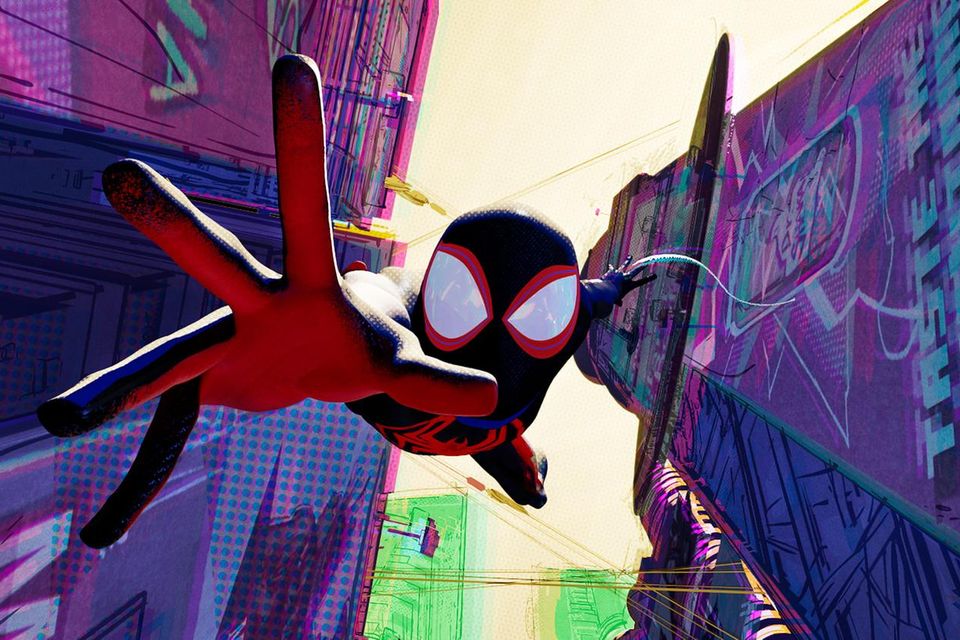Spider-Man: Across the Spider-Verse review: Multidimensional hopscotch is a thrilling spectacle
Now showing; Cert PG
Spider-Man: Across the Spiderverse is a sensory feast
One of the very best releases of 2018 was a Marvel superhero movie. The highest grossing film that year was also, as it turned out, a Marvel superhero movie. But the two films could not have been more dissimilar. They were released by different studios, for one thing, and told their sagas using wildly different visual formats. One had a cool title. One didn’t.
The other great distinction between them was that Spider-Man: Into the Spider-Verse was good. Exceptionally, award-winningly good. Avengers: Infinity War, meanwhile, was not.
Disney’s memo for the gargantuan awesomeness of Infinity War (and Black Panther, preceding it by a few months) to sweep aside every other caped crusade or super-powered escapade somehow failed to reach Sony.
That studio has had the rights to the character of Spider-Man long before Iron Man, Thor and Co set forth to smash box office records.
Read more
Made for a fraction of your average Marvel Cinematic Universe (MCU) budget, Spider-Man: Into the Spider-Verse was an animated take on Marvel Comics’ most enduring superhero that saw the myth transplanted to Miles Morales (voiced by Shameik Moore), an Afro-Latino teen and science whizz living in Brooklyn.
Not only was it more dynamic, innovative and entertaining than anything you could remember from the MCU stable, its mixed-medium visual style – merging CGI, hand-drawn techniques, and vintage comic-art stylings – was a breathtaking leap into new territory that helped secure it an Oscar for Best Animated Feature.
A lot has changed since 2018, however. Superhero excursions into the “multiverse” – an endless litany of parallel dimensions where reality can be dramatically upended – are now somewhat old news. Those with the enthusiasm or energy to carry on with the MCU have had to endure quantumanias and multiverses of madness. Any encore for Mile Morales (confirmed, in fairness, by the first film’s post-credits sequence) couldn’t just be more exhaustive interdimensional hopscotch with some cool visuals.
Gwen Stacy (Hailee Steinfeld), the Spider-girl of Miles’s romantic longing, reappears at his window in Brooklyn and encourages the grounded teen to don his Spider-Man outfit and join her on a mission. A supervillain called the Spot (Jason Schwartzman) has found a way to monkey around with the boundaries between dimensions.
Gwen has been sent back to Miles’s world to find the Spot before he can upset the cosmic order of things. She takes orders from Miguel O’Hara (Oscar Isaac), a grim futuristic Spider-Man who watches over the multiverse from a version of Earth inhabited solely by Spider-People.
Fairly standard multidimensional jiggery-pokery, you might say. But as with its predecessor, this film’s bold visual acuity, dazzling humour, and momentous pace are where it manages to be more than just the sum of its storyline.
Co-directors Joaquim Dos Santos, Kemp Powers and Justin K Thompson limit the mayhem to six worlds, each with a distinct artistic style and a striking take on the ubiquitous hero. A London punk Spider-Man (Daniel Kaluuya) is presented in scratchy Jamie Reid collage, while an Indian Spidey (Karan Soni) bounds through a collision of Manhattan and Mumbai.
The smashing together of styles new and old, the way the hyper-modern is edged with the Roy Lichtenstein-esque pointillism of the original comic books, makes for a retro-futuristic spectacle once again.
At times it is almost too much – some of the action set-pieces hurtle towards you unrelentingly. But just as they threaten to smother the film in spectacle, a way is found to bring things back to the story of a young man learning the timeworn adage of great power and great responsibility.
If there can be any real complaint about Spider-Man: Across the Spider-Verse, it’s that we’re left on something of a cliffhanger. Whereas the first film wrapped up neatly (albeit with a teaser for the devotees who stuck around after the credits), this is squarely part of a storyline that will be completed with the third instalment, due next spring.
As with Denis Villeneuve’s first Dune (2021), there is the slight feeling of having watched half a film. But even half of one of these Spider-Verse outings is still a tremendous thing.
Four stars










